People who have experienced mouth ulcers know the discomfort and pain that this condition can cause. Eating becomes next to impossible, and whatever little you try to ingest goes down very painfully. Stress has a big role to play in these ulcers appearing inside the mouth, along with malnutrition. The exact causes of mouth ulcers vary from person to person. Some of the common causes of mouth ulcers include:
Friendly Reminder: The information shared here is for educational purposes only and the reader should consult a registered medical practitioner before implementing any changes to their health routine.
Did You Know?
There are several drugs and medications available in the market that can provide temporary relief from the condition. It is important to consult a doctor for the correct diagnosis and treatment of oral ulcers. Simple home remedies may help in addition to the prescribed treatment. Here is a list of home remedies that are popular for mouth ulcers.

Honey has many beneficial properties. However, you may be unaware of the fact that it can also be effective for mouth ulcers. Apply honey to the ulcers and let it remain. Since the ulcers are inside the mouth, you can accidentally ingest the applied honey along with your saliva. However, it is essential that you keep applying honey to the ulcer spots after every few hours1.
Honey has antimicrobial properties and can aid in repairing any open wound quickly. Aside from reducing the ulcer, the honey also protects the area from infections.
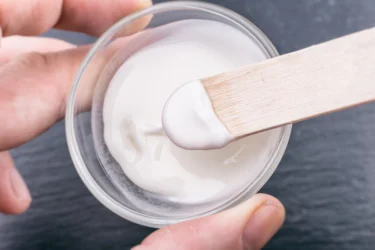
Take equal amounts of baking soda and water. Mix them to create a thick paste. Apply this paste to the mouth ulcer and let it dry out. Once the mixture has dried, rinse your mouth with water and gargle as well. This should be done three times a day.
Baking soda is actually a chemical compound named sodium bicarbonate. This compound is used in many home-cleaning solutions. It also acts as one of the best mouth ulcer cures, as it can reduce the pain significantly2. The baking soda neutralizes the acid formed by the ulcer, which eventually treats the condition.
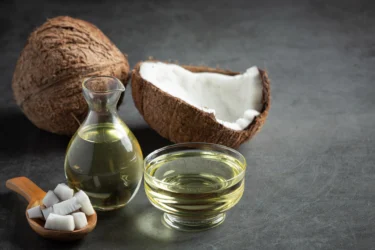
Coconut oil is used in a wide variety of activities across most of India. However, very few people are aware of its healing properties when it comes to mouth ulcers. Simply apply a bit of coconut oil to the surface of the ulcer and let it stay on. You can also apply it while going to sleep at night. Similar to honey, coconut oil includes antimicrobial properties that help to reduce ulcers naturally. The same compound also acts as an anti-inflammatory and analgesic treatment for your mouth ulcers. Applying the oil can reduce the pain caused by mouth ulcers.
Oil pulling where you swish oil in your mouth for several minutes might also help in healing mouth ulcers. Though it can be done with any oil, studies11 have shown that oil pulling especially with sesame oil might be more effective at reducing harmful bacteria in the mouth than chemical mouthwashes. It might also be effective in decreasing plaque and gum inflammation making it a great home remedy for better oral health.
Dr. Nayana Shetty, MBBS, MD
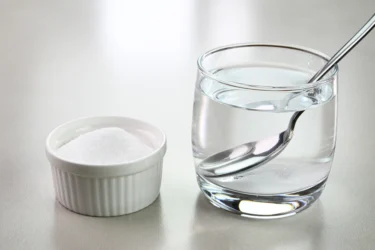
Mix a tablespoon of salt in a glass of lukewarm water. Now gargle thoroughly using this liquid. Once you are done, you can gargle with plain water to remove the salty taste from your mouth. Using this procedure, you can soothe some of the pain and discomfort that you experience during the mouth ulcer4. The antiseptic properties of salt are well known.
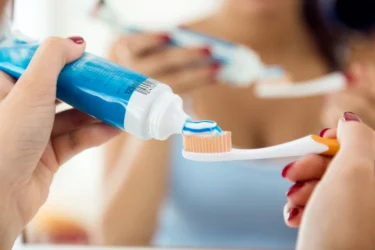
Who knew that simple toothpaste can help against mouth ulcers as well? However, any good toothpaste contains antimicrobial properties that can reduce the swelling and pain of mouth ulcers.
Apply the toothpaste using a Q-tip. Ensure that you cover the entire ulcer region with toothpaste. Leave the paste on for a few minutes before rinsing it off. You can keep applying the toothpaste each day until you see the whiteness disappear from the ulcer9. However, applying toothpaste to the ulcer can be quite painful. This pain can be offset by applying aloe vera gel on the spot.

Orange is a great source of Vitamin C, which can prevent and aid mouth ulcers. However, consuming a whole orange may be difficult when you are suffering from these ulcers. A great remedy for mouth ulcers is to drink two glasses of freshly squeezed orange juice every day.
Research has shown that Vitamin C deficiency can lead to mouth ulcers. Apart from this, Vitamin C is known to boost the immunity of a person, allowing their body to fight against all kinds of infections and diseases.
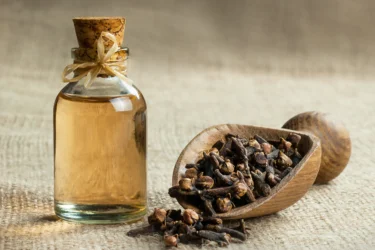
Clove is an essential part of one of the most used spice mixes in India, Garam Masala. Clove oil is extracted from the flower bud. This extract is used in a wide range of natural remedies, including toothache and mouth ulcers. In case of mouth ulcers, take a small piece of cotton and apply the oil directly to the ulcer. Wait till the ulcer tissue absorbs the oil.
Remember to rinse your mouth with warm water prior to the application of the clove oil. This will clean up the surface of the ulcer region. Clove contains eugenol and antimicrobial properties that help deal with all oral issues. The pain and inflammation are also treated by the application of this oil10.
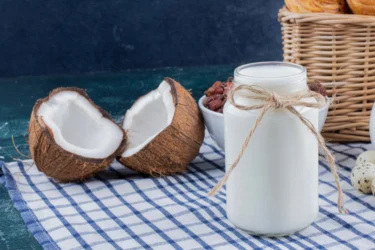
Use coconut milk to gargle when you are suffering from mouth ulcers. This is one of the best remedies for a mouth ulcer. When repeated three to four times each day, you are likely to feel a soothing effect and also reduced pain emanating from your ulcers5.
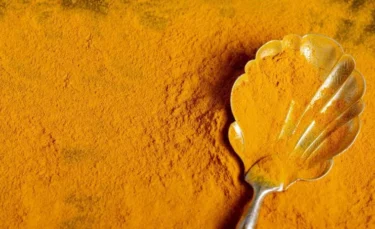
Turmeric is an antiseptic, which is used in almost all Indian dishes. Along with fighting infections, turmeric is also effective in battling against the inflammation and pain from mouth ulcers6. The product has antimicrobial properties as well.
Take a bit of turmeric powder and some water. Mix to form a thick paste. Apply this paste on the ulcers every morning and evening. Leave it on for a few minutes and then rinse it off properly. You should start noticing the difference immediately.
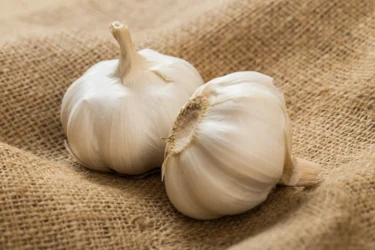
Garlic is another common item in every Indian kitchen. While it is commonly used to flavour curries and dals, garlic can also act as a great remedy for mouth ulcers. The Allisin compound present in garlic makes it antimicrobial, which helps against a range of infections7.
To use garlic, cut a clove in half and dab it on the ulcer spot for a minute or two. After this is done, rinse your mouth properly to remove the raw garlic odour from your breath. You can repeat this twice or even thrice each day.
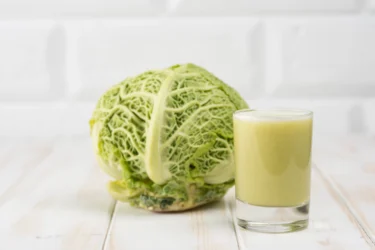
Boil a raw cabbage and puree it once after it is sufficiently boiled. Drink this juice three to four times each day to receive the needed benefits. Cabbage possesses anti-inflammatory properties that can reduce the pain in your mouth, allowing you to consume solid foods easily, even though you may be suffering from severe mouth ulcers.
Also Read: Easy Home Remedies for Bleeding Gums
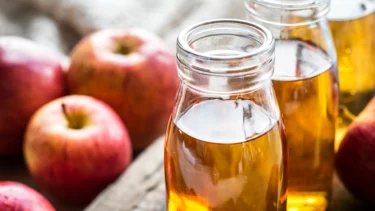
Next time you are at the grocer’s, pick up a bottle of apple cider vinegar. Take a tablespoon of this and mix it with half a cup of warm water. Take this solution inside your mouth and rinse with it. Keep repeating for a minute or two. Once this is done, rinse your mouth thoroughly with plain water. You can keep repeating this every morning and evening, till the time that the ulcer heals.
Apple cider vinegar has anti-bacterial properties that will kill the germs which caused the ulcer in the first place. It will also speed up your recovery.
These are some of the home remedies that will likely improve mouth ulcers. However, there are several kinds of mouth ulcers, each with a different cause and treatment. Some mouth ulcers where bleeding occurs may be more severe than normal ulcers. Try out these hacks and see whether you receive any benefits from them. If you do not notice any improvement, you should visit the doctor immediately.
It is important to understand that oral ulcer cure depends on the type and cause of the ulcer. A doctor can best advise you on this. Above mentioned remedies are popular but lack scientific evidence and may not be effective for everyone.
Capsicum found in chillies and bell peppers, is not just a spice but may also act as a natural remedy for mouth ulcers. Its anti-inflammatory properties may help reduce pain and promote the healing of mouth ulcers, making it a useful addition to your home treatment options.
Dr. Nayana Shetty, MBBS, MD
If you already have a mouth ulcer, avoid some food and drinks to prevent the condition from deteriorating further. You can avoid the following food in order to heal the mouth ulcer faster.
At any rate, most mouth ulcers take around 7 to 10 days to be completely cured. You should have no issue with it once a couple of weeks pass by.
Papaya, specially its fruit and latex (papain) may help with treating mouth ulcers. This fruit is rich in vitamins and papain has natural anti-inflammatory properties that may help in soothing irritation caused by mouth ulcers. Simply applying fresh papaya or papain directly to the affected area may provide relief.
Dr. Nayana Shetty, MBBS, MD
Also Read: Best Home Remedies for Wisdom Tooth Pain
As effective as home remedies may be, you must also have a backup plan in case the home remedies for mouth ulcers fail:
Some other telling signs that can indicate that your mouth ulcer is not just a normal ulcer but could maybe even be mouth cancer are if you smoke products containing tobacco if you drink alcohol quite frequently, and if are infected with human papillomavirus (HPV).
For the best result, follow the medications and home remedies advised by a doctor. The best way to avoid mouth ulcers, however, is to avoid overstressing yourself, maintain proper oral hygiene and follow a balanced diet.
Also Read: Home Remedies For Teeth Whitening By Dr. Siddharth Gupta
Most mouth ulcers are caused by things you can try to avoid, such as biting the inside of your cheek. Braces, badly fitting dentures, rough fillings or a sharp tooth are also responsible for mouth ulcers. Cuts or burns while eating or drinking, for example, hard food or hot drinks can aggravate mouth ulcer causes3, 4.
The combination of salt and hydrogen peroxide will help the sore caused by mouth ulcers heal faster. Sometimes the simplest remedy is the best. You can also add some salt to warm water and rinse for about 30 seconds to get relief.
Aphthous ulcers, also called canker sore, are small painful sores inside the mouth. They are oval-shaped ulcers with a yellow-grey centre that a red ring surrounds. Canker sores typically last 1–2 weeks8.
A mouth ulcer typically appears as a round or oval sore inside the mouth. It is often white, yellow, or gray in color, surrounded by redness, and can be painful or sensitive to touch8.
Yes, bananas can be beneficial for mouth ulcers due to their soft texture and high content of vitamins B6 and C, which can help in healing. They are also gentle on the irritated area and can provide relief from discomfort.
Mouth ulcers are not contagious. They are typically caused by factors such as minor injuries, stress, or certain foods, and cannot be transmitted from one person to another through direct contact or sharing utensils8.
Mouth ulcers can sometimes be a symptom of oral cancer, especially if they do not heal within a few weeks, are accompanied by other symptoms like persistent pain or changes in the mouth’s lining, or if there are risk factors such as tobacco use. It’s important to consult a healthcare professional for proper evaluation and diagnosis3.
B complex vitamins, especially B1 (thiamine), B2 (riboflavin), B6 (pyridoxine), and B12 (cobalamin), are beneficial for mouth ulcers as they support the health of mucous membranes and aid in wound healing. Taking B complex supplements or consuming foods rich in these vitamins can help reduce the frequency and severity of mouth ulcers3.
A mouth ulcer appears white due to the layer of dead cells and fibrin that form over the ulcerated area during the healing process. This white coating is part of the natural response of the body to protect the underlying tissue and aid in healing8.
It is not advisable to pop or burst a mouth ulcer. Doing so can increase pain, delay healing, and potentially lead to infection. It’s best to let mouth ulcers heal naturally and manage discomfort with appropriate oral care or medications as recommended by a healthcare provider.
Yes, a severe or persistent mouth ulcer can sometimes cause nearby lymph nodes to swell as part of the body’s immune response. This reaction typically occurs when the ulcer is inflamed or infected, prompting the lymph nodes to react and become swollen in an effort to combat the underlying issue.
Yes, mouth ulcers can cause referred pain to nearby areas such as the teeth, ears, or jaw. The discomfort may radiate due to shared nerve pathways or inflammation affecting adjacent tissues. Treating the underlying cause of the mouth ulcer can often alleviate these associated pains.
Mouth ulcers typically do not cause fever. However, if a mouth ulcer is severe, infected, or part of a larger systemic issue, it may occasionally be accompanied by a low-grade fever. In such cases, it’s advisable to consult a healthcare professional for proper evaluation and treatment.
Are mouth ulcers caused by stress?
Mouth ulcers themselves are not indicative of HIV (Human Immunodeficiency Virus) infection alone. However, persistent or recurring mouth ulcers can be a symptom of HIV/AIDS in conjunction with other signs like swollen lymph nodes, fatigue, and weight loss. Testing for HIV is necessary for accurate diagnosis if there is concern.
Yes, paracetamol can help alleviate the pain associated with mouth ulcers. It is an analgesic that can reduce discomfort, making it easier to eat and drink. However, it is important to follow the recommended dosage and consult a healthcare provider for persistent or severe pain.
Yes, rinsing with a saltwater solution can help alleviate pain and promote healing of mouth ulcers. The saltwater solution has antimicrobial properties that can reduce inflammation and prevent infection in the ulcerated area4.
Mouth ulcers themselves typically do not cause headaches directly. However, the discomfort or pain associated with severe mouth ulcers, especially if they are large or located in sensitive areas, may contribute to a headache due to increased stress or discomfort.
Smoking can contribute to the development of mouth ulcers. The chemicals in tobacco smoke irritate the delicate tissues of the mouth and throat, leading to increased susceptibility to ulcers. Additionally, smoking can impair the immune system’s ability to heal existing ulcers, prolonging their duration.
Yes, mouth ulcers can contribute to bad breath. The presence of an ulcerated area in the mouth can harbor bacteria and food debris, leading to an unpleasant odor. Additionally, the discomfort caused by mouth ulcers may reduce the effectiveness of regular oral hygiene practices, further exacerbating bad breath8.
Mouth ulcers themselves do not typically cause dry mouth. However, certain conditions that may lead to mouth ulcers, such as stress or certain medications, can also cause dry mouth as a separate symptom. A dry mouth can contribute to discomfort and may affect the healing process of mouth ulcers.
Disclaimer: The information provided here is for educational/awareness purposes only and is not intended to be a substitute for medical treatment by a healthcare professional and should not be relied upon to diagnose or treat any medical condition. The reader should consult a registered medical practitioner to determine the appropriateness of the information and before consuming any medication. PharmEasy does not provide any guarantee or warranty (express or implied) regarding the accuracy, adequacy, completeness, legality, reliability or usefulness of the information; and disclaims any liability arising thereof.
Links and product recommendations in the information provided here are advertisements of third-party products available on the website. PharmEasy does not make any representation on the accuracy or suitability of such products/services. Advertisements do not influence the editorial decisions or content. The information in this blog is subject to change without notice. The authors and administrators reserve the right to modify, add, or remove content without notification. It is your responsibility to review this disclaimer regularly for any changes.